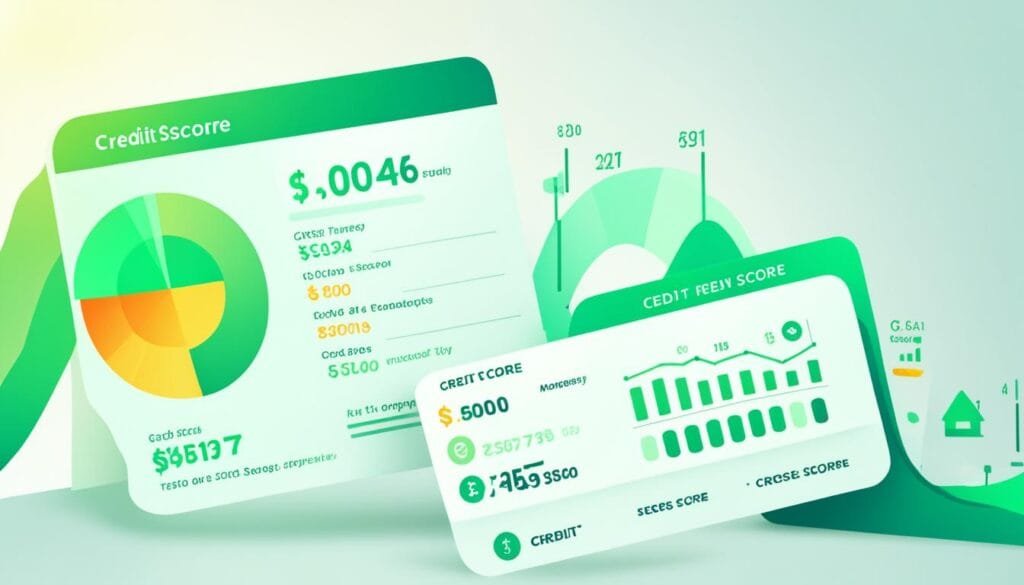Imagine this: You’ve been eyeing a new car for months, dreaming of the day you can drive it off the lot and feel the wind in your hair. But there’s just one problem – your credit score. It’s not where it needs to be to secure a favorable loan. The thought of missing out on your dream car is disheartening, but you refuse to let your credit score hold you back.
You’ve heard about the power of credit score improvement and the importance of credit score strategies. Determined to turn your financial situation around, you begin researching and learning everything you can about setting and achieving credit score targets.
With a clear plan in mind, you start implementing the strategies you’ve learned. You start paying your bills on time, reducing your credit card balances, and monitoring your credit report for any inaccuracies. It’s not easy, and there are challenges along the way, but you stay focused on your goal of improving your credit score.
Months pass, and you begin to see progress. Your credit score starts to rise, and with a renewed sense of confidence, you walk into the car dealership. Armed with your improved credit score and a strong understanding of credit score management, you negotiate favorable loan terms and drive away in your dream car.
This story may be fictional, but the scenario it presents is all too real for many individuals. Setting clear credit score goals and implementing effective credit score strategies can make a significant difference in achieving financial success. By taking control of your credit and working towards building a healthier financial future, you can achieve the goals you’ve set for yourself.
Key Takeaways:
- Credit score target setting is crucial for achieving financial success.
- Implementing effective credit score strategies can improve your credit score.
- Setting clear goals and staying focused on them can help you overcome obstacles along the way.
- Monitoring your credit report and addressing inaccuracies is essential for credit score improvement.
- Improving your credit score opens doors to favorable loan terms and financial opportunities.
The Danger of Debt
Debt can be both a useful tool for building wealth and a potential financial pitfall if not managed properly. When used appropriately, debt can provide opportunities for investment and growth. However, excessive debt can lead to financial struggles and limit future financial options. It is crucial to understand the risks and consequences of debt, especially when it comes to compounding interest on credit cards and student loans.
Credit cards are one common source of debt. The convenience they offer can make it easy to overspend and accumulate high-interest balances. If not paid off in full each month, the compounding interest on credit card debt can quickly escalate the total amount owed, making it more difficult to eliminate the debt over time.
Student loans are another form of debt that can have long-lasting effects. While they can be necessary to finance higher education, the accumulation of student loan debt can be overwhelming, especially if the borrower is unable to secure a high-paying job after graduation. The interest accrued on student loans can significantly increase the overall amount owed, making it challenging to pay off the debt in a timely manner.
“Taking on too much debt without a solid plan for repayment can be a recipe for financial disaster.”
It is important to approach debt with caution and consider the potential consequences. Taking on excessive debt can limit financial freedom, affect credit scores, and hinder progress towards achieving future goals. To avoid falling into a cycle of debt, individuals should carefully evaluate their financial situation, develop a budgeting strategy, and prioritize debt repayment.
By understanding the dangers associated with debt and making informed decisions regarding credit card usage and student loans, individuals can avoid the pitfalls of overwhelming debt and work towards achieving financial stability and freedom.
The Consequences of Compounding Interest
Compounding interest is a financial phenomenon that can significantly impact debts, especially those incurred through credit cards and student loans. It occurs when interest is added to the principal balance and, over time, interest is charged on both the original amount borrowed and the accrued interest. The compounding effect can result in substantial increases in the total amount owed, making it difficult to escape the cycle of debt.
“Understanding the risks and consequences of excessive debt is crucial for maintaining financial stability and avoiding long-term financial struggles.”
Credit cards often come with high-interest rates, and making only minimum payments can prolong the repayment process and lead to increased interest charges. Student loans also accrue interest over time, and failing to address these debts promptly can lead to a significant accumulation of interest and a prolonged repayment period.
It is crucial for individuals to proactively manage their debt to minimize the impact of compounding interest. By making regular payments above the minimum requirement and focusing on reducing the principal balance, individuals can mitigate the long-term effects of compounding interest and regain control of their financial situation.
Sacrificing Your Future Fun
While in college, many individuals find themselves accumulating student loans and credit card debt, often using credit to finance immediate enjoyment without considering the long-term consequences. However, this approach can result in sacrificing future financial freedom. It’s crucial to consider the impact of loan obligations and make informed decisions about borrowing to avoid limiting future opportunities and experiences.
Student loans are often seen as a necessary means to achieve higher education and secure better career prospects. However, it is important to understand the long-term implications of these loans. Taking on excessive student loan debt without a clear plan for repayment can burden individuals with significant financial obligations well into adulthood.
Credit card debt, on the other hand, typically arises from impulsive spending habits. Many individuals rely on credit cards to fund their current lifestyle, often overlooking the potential consequences. However, the high-interest rates associated with credit cards can quickly escalate debt levels and lead to long-term financial stress.
By succumbing to the allure of immediate enjoyment without considering the long-term repercussions, individuals risk sacrificing their financial freedom. The burden of student loans and credit card debt can limit opportunities, preventing individuals from achieving their future goals.
“It is unwise to sacrifice long-term financial security for short-term pleasure.” – Mary Smith, Financial Advisor
To avoid such sacrifices, it is crucial to make informed decisions about borrowing and spending. Individuals should evaluate their loan obligations carefully, considering factors such as interest rates, repayment terms, and their ability to meet monthly payments. By creating a realistic budget and prioritizing debt repayment, individuals can avoid the pitfalls of excessive student loans and credit card debt.
It is important to remember that delaying gratification and making responsible financial choices now can lead to a more secure and fulfilling future. By focusing on long-term goals and consistently managing debt, individuals can regain control of their financial situation and open doors to a brighter future.
The Impact of Loan Obligations
| Loan Type | Pros | Cons |
|---|---|---|
| Student Loans | – Access to higher education opportunities – Potential to increase earning potential – Ability to build credit history | – Accumulated debt obligations – Repayment challenges – Limited financial flexibility |
| Credit Card Debt | – Convenient purchasing power – Consumer protection benefits – Opportunity to build credit score | – High-interest rates – Potential for escalating debt – Financial strain |
Understanding the impact of loan obligations is necessary for making informed decisions about borrowing and managing debt. It’s important to weigh the pros and cons of student loans and credit card debt, considering the long-term consequences on financial stability and future opportunities.
How Much Good Debt to Take On
Understanding how much good debt to take on is essential for maintaining financial stability. For most students, student loans and possibly a car loan are the only necessary debts during college and the initial years after graduation. It is important to keep debt payments within a reasonable percentage of take-home pay to ensure manageable financial obligations and avoid becoming overwhelmed by debt.
“Borrowing for education is considered good debt because it can lead to higher earnings and career opportunities. However, it’s crucial to borrow responsibly and only take on the amount necessary to cover tuition and living expenses. Carefully consider the potential return on investment before taking out student loans.”
When it comes to car loans, it’s important to assess affordability based on monthly payments and overall debt-to-income ratio. Opting for a car loan with a manageable monthly payment ensures that it doesn’t exceed a reasonable percentage of take-home pay.
It’s vital to prioritize debt payments and avoid overextending oneself financially. Making timely debt payments helps establish a positive credit history, which is essential for future financial endeavors.
Managing Debt Payments
One effective strategy for managing debt payments is budgeting responsibly. By creating a monthly budget that includes debt payments as a fixed expense, individuals can track their income and expenses, ensuring they allocate enough funds towards debt repayment.
Finding the Right Balance
When deciding how much good debt to take on, it’s crucial to strike the right balance between debt obligations and overall financial well-being. Taking on too much debt can lead to financial stress and impact one’s ability to achieve other financial goals, such as saving for emergencies or long-term investments.
By carefully evaluating the affordability of debt payments and keeping debt obligations within a reasonable range, individuals can maintain financial stability and avoid the negative consequences of overwhelming debt.
The Risks of Excessive Debt
Excessive debt can hinder financial progress and limit opportunities in various ways:
- High debt payments can strain monthly budgets and limit disposable income for savings or investments.
- Too much debt can impact credit scores, making it difficult to obtain favorable interest rates on future loans or credit cards.
- Excessive debt can lead to financial stress and impact overall well-being and mental health.
To avoid these risks, it’s important to assess one’s financial situation and make informed decisions about taking on debt. Keeping debt payments manageable and within a reasonable percentage of income is key to achieving financial stability.
Signs You Have Too Much Debt
Recognizing the signs of excessive debt is crucial for taking appropriate action and regaining control of finances. Here are some indicators that an individual may have too much debt:
- Inability to make minimum credit card payments
- Constant financial strain
- Contact from bill collectors
- Considering debt consolidation loans
If you find yourself unable to make even the minimum payments on your credit cards, it’s a clear sign that your debt is overwhelming. This can lead to compounding interest and further financial strain. Additionally, if bill collectors start reaching out to you for unpaid debts, it’s an indication that your situation has escalated. Considering debt consolidation loans as a solution may be a sign that you need help managing your debt.
Recognizing these signs early on can prompt you to seek debt management strategies and work towards achieving financial stability.
Excerpt from Debt Consolidation Statistics:
“According to recent statistics, [insert relevant statistics here]. This highlights the increasing need for debt consolidation as a viable solution for individuals struggling with overwhelming debt.”
| Signs of Excessive Debt | Actions to Consider |
|---|---|
| Inability to make minimum credit card payments | Seek debt counseling, negotiate with creditors |
| Constant financial strain | Create a budget, cut expenses, increase income |
| Contact from bill collectors | Seek legal advice, explore debt settlement options |
| Considering debt consolidation loans | Research reputable consolidation programs, consult with financial advisors |
Getting and Using a Credit Card
When used responsibly, credit cards can be valuable financial tools that offer convenience, consumer protections, and the potential to build credit scores. Understanding the benefits of credit cards, such as secure and convenient purchasing, consumer protections, and credit score improvement, is important for making informed decisions related to their acquisition and use.
One of the significant benefits of credit cards is the convenience they offer. With a credit card, individuals can make purchases online or in-store without the need for carrying cash. This convenience is especially beneficial for larger purchases or when traveling, as credit cards provide a secure and widely accepted payment method.
Furthermore, credit cards come with consumer protections that can safeguard individuals against fraudulent transactions. Many credit card companies offer zero liability policies, which means that in cases of unauthorized charges, the cardholder is not held responsible for any fraudulent activity.
Additionally, credit cards can help individuals build and improve their credit scores. By using a credit card responsibly and making regular, on-time payments, individuals can demonstrate their creditworthiness to lenders. This responsible utilization of credit cards can help individuals establish a positive credit history, which is crucial for obtaining favorable interest rates on loans and other financial opportunities.
“Credit cards offer convenience, consumer protections, and credit score improvement benefits.”
| Credit Card Benefits | Description |
|---|---|
| Convenience | Allows for cashless transactions, secure online shopping, and widly accepted payment method. |
| Consumer Protections | Offers zero liability policies, protecting individuals against fraudulent activity. |
| Credit Score Improvement | Responsible usage can help individuals build and improve their credit scores. |
However, it’s important to note that credit cards should be used judiciously and within one’s means. Accumulating excessive credit card debt can have negative consequences, such as high-interest charges and potential damage to one’s credit score. Being responsible with credit card utilization means using credit cards for necessary expenses and paying off the balance in full each month to avoid accruing interest charges.

How to Use a Credit Card
Properly using a credit card is crucial for avoiding credit card debt and the associated financial pitfalls. One key strategy is to pay off the credit card balance in full each month, as it helps to avoid interest charges and prevent the accumulation of debt. By making timely and complete payments, individuals can maintain a healthy credit card account and prevent the burden of high-interest debt.
Many people mistakenly believe that making just the minimum payments or carrying a balance from month to month is a viable payment strategy. However, this approach can result in the accumulation of high-interest debt and prolong the repayment period significantly. It is important to prioritize paying off the credit card balance to prevent interest charges from adding up and to avoid the stress of carrying long-term debt.
When using a credit card, it is essential to be mindful of interest rates and payment amounts. High interest rates can quickly escalate the debt balance and make it difficult to keep up with payments. By carefully reviewing the terms and conditions of the credit card and comparing interest rates among different cards, individuals can choose the one that best suits their financial situation and offers manageable interest rates.
Additionally, maintaining a clear understanding of credit card payments is crucial. It is recommended to set up automatic payments or reminders to ensure that payments are made on time. Late payments can result in penalties, higher interest rates, and damage to credit scores. By keeping track of payment due dates and allocating funds accordingly, individuals can stay on top of their credit card payments and avoid unnecessary fees and penalties.
Ultimately, responsible credit card usage involves staying informed about interest rates, making full payments each month, and ensuring timely payments. By following these practices, individuals can effectively use credit cards without falling into the trap of credit card debt.
Table: Tips for Responsible Credit Card Usage
| Tips | Explanation |
|---|---|
| Pay the balance in full | Prevents the accumulation of high-interest debt |
| Be mindful of interest rates | Choose a credit card with manageable rates |
| Make timely payments | Avoid penalties, higher interest rates, and damage to credit scores |
| Set up automatic payments | Ensure payments are made on time |

By adopting responsible credit card usage habits, individuals can effectively manage their finances, avoid credit card debt, and maintain a healthy credit score.
What Specific Target Should I Set for Improving My Credit Score?
When setting a specific target to improve your credit score, consider aiming for a 30-point increase within the next six months. By consistently paying bills on time, reducing credit card balances, and checking for errors on your credit report, you can take proactive steps to improve your credit score.
Conclusion
Achieving success with credit score target setting requires setting clear financial goals, understanding the dangers of debt, and implementing effective credit management strategies. By recognizing signs of excessive debt and making informed decisions about credit card usage, individuals can work towards improving their credit scores and building a healthier financial future.
When it comes to credit management, it is crucial to prioritize financial goals and develop a plan to achieve them. Whether it’s paying off existing debts, saving for a major purchase, or building an emergency fund, having a clear vision of your financial objectives will guide your credit management decisions.
Successful credit management also involves being mindful of the dangers of debt. By understanding the consequences of excessive borrowing and the effects of compounding interest, individuals can make informed decisions about taking on debt and avoid getting into financial trouble.
In addition, using credit cards responsibly is a key aspect of successful credit management. By paying off the balance in full each month and being mindful of interest rates, individuals can avoid credit card debt and maintain a positive credit score. Regularly monitoring your credit score and addressing any discrepancies or issues is also essential for successful credit management.
FAQ
What is credit score target setting?
Credit score target setting refers to the process of establishing specific goals to improve one’s credit score. It involves determining a desired credit score and developing strategies to achieve that goal.
How can I improve my credit score?
To improve your credit score, you can follow several strategies such as paying bills on time, reducing debt, keeping credit card balances low, and regularly checking your credit report for errors.
What are some credit score goals I can set?
Some common credit score goals include achieving a specific credit score range, such as 700 or above, or aiming for a significant improvement in your current credit score, such as increasing it by 100 points.
Are there any tips to help me increase my credit score?
Yes, some tips to increase your credit score include making all payments on time, keeping credit card balances low, avoiding opening too many new credit accounts, and regularly reviewing your credit report for any errors.
Is credit repair necessary for improving my credit score?
Credit repair may be necessary if you have errors on your credit report or if you have negative items that are accurate but outdated. In those cases, working with a reputable credit repair company can help resolve those issues and improve your credit score.
How long does it typically take to improve a credit score?
The time it takes to improve a credit score can vary depending on individual circumstances. Generally, it can take several months to a year or more to see significant improvements, depending on the strategies implemented and the starting point of the credit score.
Can I achieve a perfect credit score?
While it is possible to achieve a perfect credit score of 850, it is not necessary for most individuals. Typically, having a credit score in the range of 700-800 is considered excellent and can provide access to favorable credit terms and opportunities.
How does credit score management impact my financial future?
Effective credit score management can positively impact your financial future by enabling you to qualify for better interest rates on loans, obtain higher credit limits, and gain access to more favorable financial opportunities.

